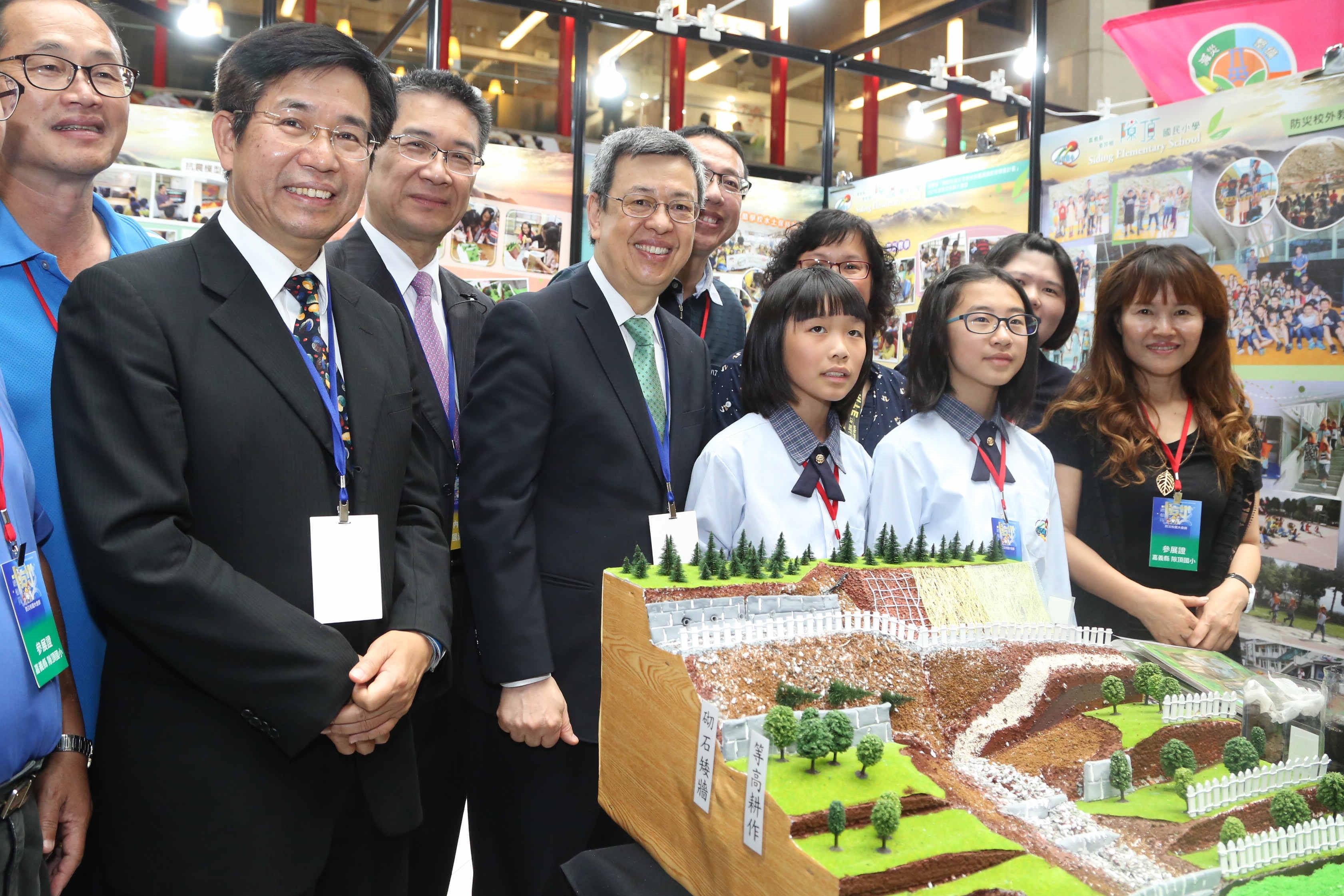The Gathering of Disaster-resilient Schools: Eight Ministries Collaborate on Disaster Risk Reduction Education, Demonstrate Achievements through a Powerful Pop-up Exhibition at Taipei Main Station

To bring attention to school safety and disaster risk reduction (DRR) education, the Ministry of Education and the Ministry of the Interior scheduled a two-day event on April 19th and 20th, 2019 entitled “Mobilization for Disaster Prevention, the Gathering of Disaster-resilient Schools,” held in the lobby on the first floor of Taipei Main Station. Ministries and Disaster-resilient schools were invited to present their achievements in DRR education.
A total of 77 Disaster-resilient schools with excellent performance across the country were invited to share their unique achievements with participants. For example, Jinhu Elementary School in Yunlin County developed a series of study tours featuring Jinhu knowledge and experience courses, the flooding history of the Kouhu Township, and the Qian Shui Zhuang Culture Festival, which enables students to have further acknowledgement and a profound understanding. Located near the Shihtan Fault, Shihtan Elementary School in Miaoli County is particularly aware of earthquake-induced damage. As well as developing a series of innovative disaster prevention teaching materials such as simplified seismic dampers and stirrups. The school promoted DRR study tours for visitors from outside the county for further exchange. Sing-an Elementary School in Chiayi City offered experimental teaching materials for landslide and soil liquefaction teaching materials, enabling students to determine disaster causes through hands-on activities.
In addition to actively promoting DRR education, schools collaborated with communities to promote and advocate such knowledge, thereby facilitating DRR work through joint efforts and enhancing the capacity for disaster management. Six schools implemented various programs:
1.Students of Xiayun Elementary School in Taoyuan City were led by the chief of the village to perform field investigations of their school and the community.
2.Using many years of self-initiated flood preparedness experience of the Yingnan community as the teaching plan for demonstration teaching, Ying Pan Elementary School in Nantou County collaborated with the aforementioned community to conduct field investigations. Students became more familiar with their living environment and its changes, and this gave them an opportunity to learn emergency responses.
3.During parent–teacher meetings, Wutan Elementary School in Pingtung County invited parents to participate in the discussion of DRR knowledge and the cooperation of emergency management teams between the school and the community, thereby attaining thorough DRR education in real life.
4.Shihmen Elementary school in Pingtung County collaborated with local indigenous youth associations to promote an indigenous-based DRR study tour to learn an ecological philosophy that focuses on nature conservation and sustainable development. Learning the skills of disaster preparedness from older adults on the basis of the concept of sustainability allows children to be familiar with unexpected conditions of disasters, rendering this an effective learning method.
5.The DRR education of Xinyi Elementary School in Taitung County focused on local hazard potentials, contributing to more perceptible learning. A DRR teaching mechanism was established in a local mabolo course with the objective of facilitating DRR vision and enabling students who are capable of rational judgment, interested in innovations, passionate about exploration, and full of wisdom.
6.Equipped with basic preparedness, Wenchang Elementary School in Tainan County administered routine disaster drills, designed courses in accordance with the school’s flood disasters, and participated in the DRR short film competition for talented children.
Other than the establishment of Disaster-resilient schools, the two-day event featured numerous smart DRR technology experience facilities of great practicality and entertainment, from various agencies, bureaus, and organizations:
1.The National Fire Agency of the Ministry of the Interior set up virtual reality (VR) equipment to provide realistic experiences of disaster scenes.
2.The Water Resources Agency of the Ministry of Economic Affairs demonstrated interactive teaching materials.
3.The Central Weather Bureau of the Ministry of Transportation and Communications provided three activities, digital star globe, broadcasting stage, and the last one, the precipitation experience which allowed participants to experience in-person the precipitation variation among heavy rain, extremely heavy rain, torrential rain, and extremely torrential rain.
4.The Soil and Water Conservation Bureau of the Executive Yuan also arranged activities, to enable participants to learn debris flow disaster relief, namely a technology and water conservation learning activity, and a four-dimensional film—"Seeing Debris Flow, and a VR escape room.
5.The National Science and Technology Center for Disaster Reduction set up numerous interactive games.
6. The National Science and Technology Museum displayed an instructional module of typhoon science and the molecular structure of water.
7.The Taipei City Fire Department provided participants with experiential learn-through-play facilities, namely a mobile billboard advertising DRR and cars that offer earthquake simulation and first-aid experiences, allowing participants to practice through engaging in the aforementioned activities.
In addition, two interactive activities were held on April 20: the “Parent–Child Handmade Workshop for Disaster Prevention.” Participants could bring their handmade products home after the DIY activity. For the “Story Ark Activities,” a famous YouTuber Peri was invited to be the picture book storyteller who transforms DRR knowledge into reading or storytelling.
The Ministry of Education, which is particularly concerned about the safety of all teachers and students, will continue to expand the establishment of disaster-resilient schools and enhance the soft power for developing such schools, thereby replacing standard-answer-oriented trainings with judgment-oriented education. With the objective of transforming DRR into an attitude toward life and extending the DRR concept from schools to communities, strengthening the DRR concept and response capabilities of teachers, students, and parents is of great importance. Thus, people can actively prevent and reduce disasters and construct a harmonious and resilient home.
Photo:Vice President Chen Chien-Jen, Minister of Education Pan Wen-Chung, and Minister of the Interior Hsu Kuo-Yung attended the DDR education exhibition. Chiayi County Siding Elementary School demonstrated the integrated disaster prevention concepts with activities, dramas, teaching materials, and drawing books.
